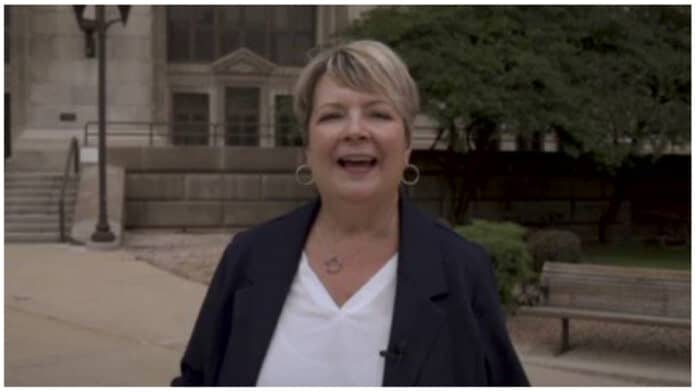Top Facts
- Janet Protasiewicz, the liberal Milwaukee judge running for state Supreme Court, says she has sentenced “tens of thousands” of people. This is false.
- We subsequently requested, through open records law, a list of all of her sentencings. She denied it. Her campaign is refusing to provide any evidence to back up her false claim.
- Judicial ethics codes say that judges should not misrepresent the facts during campaigns.
Liberal Milwaukee judge Janet Protasiewicz blatantly lied about her sentencing record, and now she’s denied an open records request for her sentencing data.
The other media won’t cover the lie. Her campaign is also refusing to provide evidence to back up her false claim – that she sentenced 10s of thousands of people. Although that number is provable false, Protasiewicz is also blocking the public from finding out exactly how many sentencings she really handled.
According to the Wisconsin Judicial Ethics code, “a candidate for a judicial office shall
not knowingly or with reckless disregard for the statement’s truth or falsity misrepresent the identity, qualifications, present position, or other fact concerning the candidate or an opponent.”
When journalist AJ Bayatpour challenged Protasiewicz about her time-served sentencing of a rapist, and the criticism that it means she has a soft sentencing record, Protasiewicz, a Milwaukee trial judge, responded, “That’s absolutely ridiculous. I have sentenced not hundreds of people, not thousands of people, but 10s of thousands of people, and I make those hard calls every single day.”
However, that is false. She has not sentenced 10s of thousands of people. The lie is on video.
After that interview, we sent an open records request to Milwaukee County’s Chief Judge Mary Triggiano. It read, “We are requesting a list (preferably in Excel) of all of Janet Protasiewicz’s sentencings since she became a judge (2014 she became a judge).”
The request was then sent by the court system to Protasiewicz herself to handle, and we received a letter back from Protasiewicz on January 19, 2023, denying our request. We also wrote Protasiewicz’s campaign asking for evidence she handled 10s of thousands of sentencings. We received no response.
The letter, signed by Protasiewicz, says that “The Wisconsin Supreme Court has on previous occasions withheld decision on whether it is subject to Wisconsin’s public records law. However, in response to your request, a search was conducted.”
Protasiewicz said the request was sent to her because she is the custodian of her own records as an elected official.
“I do not maintain a record that contains all of the information your are requesting,” she wrote, saying that, pursuant to statutes, “I am not required to create a new record by extracting information from existing records and compiling the information in a new format.”
However, in the past, Milwaukee court officials have provided data runs to journalists in Excel. For example, they have provided a list of dismissed cases in the past through open records laws.
Furthermore, the Wisconsin Department of Justice’s open records compliance guide states, “The Attorney General has advised that where information is stored in a database a person can ‘within reasonable limits’ request a data run to obtain the requested information. Use a rule of reason to determine whether retrieving electronically stored data entails the creation of a new record. Consider the time, expense, and difficulty of extracting the data requested, and whether the agency itself ever looks at
the data in the format requested.”
We have also sent an open records request to the Milwaukee County Clerk of Courts for the data.
Protasiewicz has defended letting rapist abductor Anton Veasley walk out the courthouse door on sentencing day despite the fact he abducted and raped a teenage girl he randomly saw walking down the street in Milwaukee. She gave him no prison time, time served, and probation.
As for criticism she's received for a 2021 sentence, where she declined to give additional prison time for a child enticement/3rd deg. sexual assault conviction, Protasiewicz says, "You don't have a crystal ball. I knew the facts that I knew at the time." pic.twitter.com/ZDYUMYSHRE
— A.J. Bayatpour (@AJBayatpour) January 15, 2023
According to Ballotpedia, Protasiewicz was first elected judge on April 1, 2014. Before that time, she was a prosecutor, not in a position to sentence anyone. Her campaign says she has spent part of her time as a Milwaukee judge in family court where, again, she would not be in a position to sentence anyone. A judicial rotation confirms she was assigned to family court in June 2021. CCAP confirms that she’s still currently in family court.
Later in the same interview, Protasiewicz said that the Republican Party of Wisconsin had filed an open records request “for every case I have touched since I became a judge and there are thousands of them.”
We asked the State Republican Party for the list of Protasiewicz’s cases. Included on the list of cases: A lot of cases for which there was no sentencing, things like civil, small claims, and family cases. The list also includes cases that were dismissed.
We ran a computer formula to determine how many cases had Protasiewicz’s name attached to them, and we came up with:
Felonies 1,035
Misdemeanors 1,554
Criminal Traffic 879
Traffic 1,808
Total 5,276
That’s obviously nowhere close to the “tens of thousands” of cases she claimed and, again, all of those cases are not sentencings. That’s why we asked the courthouse for a list of her sentencings to no avail in an attempt to get an exact number. Either way, it won’t be more than 10,000 and certainly not close to 20,000.
Furthermore, that number is inflated because we included traffic cases, which arguably aren’t sentencings. A number of the cases were before Protasiewicz as a judge but did not go to sentencing.
The point is: Protasiewicz lied. She has not sentenced “tens of thousands” of people. And she is trying to block the public from learning the exact number.
Let’s do the math another way. There have been 2,618 days from April 1, 2014 to June 1, 2021, and, of course, some of those were weekends. She would have had to handle more than 7 sentencing hearings every single day, including every Saturday and Sunday, without taking any days off, ever, to reach 20,000 sentencing hearings.
Impossible.
Ac
Table of Contents







![Protecting Portland: No Good Deed Goes Unpunished [REVIEW]](https://www.wisconsinrightnow.com/wp-content/uploads/2025/07/portland-356x220.jpg)























